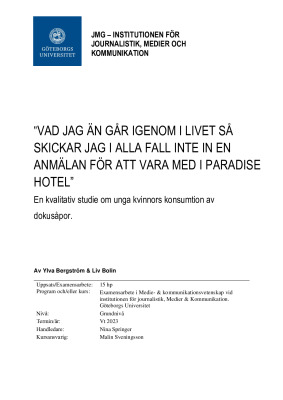”VAD JAG ÄN GÅR IGENOM I LIVET SÅ SKICKAR JAG I ALLA FALL INTE IN EN ANMÄLAN FÖR ATT VARA MED I PARADISE HOTEL”
En kvalitativ studie om unga kvinnors konsumtion av
dokusåpor.
Executive summary
The purpose of this bachelor thesis is to delve into the world of docusoaps and explore the fascinating phenomenon of why people watch them. By focusing on the Uses and Gratification framework and the Social Comparison Theory we aim to shed light on the underlying motivations, needs and psychological aspects that attract viewers to this unique genre of television programming.
Through a comprehensive analysis of scholarly research and in-depth interviews in pairs, we will examine the various reasons individuals seek out and engage with docusoaps. We will explore how these shows fulfill specific needs and gratify specific desires, including entertainment, escapism, social comparison, and attitudes. By investigating these underlying factors, we aim to provide valuable insights into the complex interplay between audience preferences and media consumption habits. Moreover, this study will contribute to a broader understanding of the impact of docusoaps on individuals’ perceptions, attitudes, and behaviors.
In the following chapters, we will provide a comprehensive review of relevant literature, discussing key theories and frameworks within the fields of media studies. Furthermore, we will present the research
methodology employed in this study, detailing the steps taken to gather and analyze data. Finally, we will present our findings, offering a nuanced perspective on the uses and gratification and social
comparison aspect of why young women watch docusoaps. As a method for the study, qualitative interviews were used. A total of eight individuals participated in the interviews, which were conducted in pairs. The interviews were based on a semi-structured interview guide designed according to the Uses and Gratification theory, Social Comparison theory, and the purpose of the study.
The study’s results indicate a consumption behavior that suggests ritualized habits where the content of the docusoap is not the main focus. The content of the docusoap has been found to be less important as it primarily serves as background noise while other activities are performed. The study reveals a consumption behavior characterized by multi-screening and TV-multitasking related to the docusoaps.
The results also demonstrate that the docusoap is subject to various comparison processes between viewers and participants. Lastly, the study shows that there is a strong social value in consuming docusoaps.

